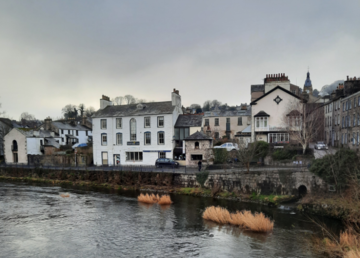Home from home - staying connected through COVID
Hopefully, this can help overcome some homesickness and make your first year of uni feel a bit less dominated by the same four walls!

Lily Tidman's hometown in Cumbria
Lily Tidman is a final year undergraduate studying History and Politics at St Hilda’s College. Originally from Cumbria, she finds the opportunity to immerse herself in two different worlds at home and Oxford thrilling and thought-provoking. She is currently writing her thesis on women’s experiences of healthcare and travel in 1960s-'70s Cumbria and plans to undertake a Masters after graduating.
With current government guidelines meaning many ways to stay connected to those at home and around you are on hold, freshers and prospective applicants may be wondering whether travelling from far away to study at Oxford is worth it. Starting a new degree can be a daunting time under any circumstances, especially for people who are applying from further afield! The prospect of not being able to just pop back to existing support networks can seem scary, but there are many ways to keep in touch both with loved ones far away and with your surroundings in Oxford. History & Politics finalist Lily Tidman lives – at minimum, depending on the whims of the railway network – a 6-hour journey from Oxford, and here shares her tips on how to stay connected away from home at a time when that can seem increasingly difficult.
There’s no denying it – studying History at Oxford can mean your days are more likely to involve reading and writing for essays rather than being in labs, practical studies or field trips like your peers studying science-based degrees. Whilst there are definitely advantages to this – your schedule is very flexible, and you can truly immerse yourself in the subjects you love – in tandem with current restrictions on social events, it can give you a lot of time on your hands. There are many strategies new students can use to broaden their social and academic horizons, some directly expanding on your studies, and others just for fun!
Especially in winter, it can be tempting to spend a lot of time here holed up in your specific favourite of Oxford’s gorgeous libraries without actually seeing large chunks of the place you’re studying in. All the University libraries are open to students from other courses, and it can be easy to study here for years without seeing the range of different study spaces available! As well as libraries which you might use for your course reading, like the History Faculty, Social Science, and Sackler libraries, there are some real underrated gems, including the Weston Library on Broad Street and Pusey House Library on St Aldate’s (which isn’t part of the university but is open to undergraduates). Spice up your reading life – it will probably improve your concentration and help you get to know the city better for later in your degree when you’ll (hopefully) be able to see more of it!
Under normal circumstances, new students would discover different areas of the city through lectures, tutorials and socialising at crewdates or society events. Whilst these opportunities to tick all the colleges off your Oxford bucket list might be less than achievable right now, walking tours of the city have always been popular, and it’s well worth the effort to make your own. Exploring Oxford on foot is a wonderful way to immerse yourself more thoroughly in your current environment, giving you a change of scene from your room and helping you get to know the city better. Hopefully, this can help overcome some homesickness and make your first year of uni feel a bit less dominated by the same four walls! It can also complement your studies, especially if you’re studying medieval history; British Isles History modules often include studies of the University. A great way to immerse yourself in your subject and feel more connected to your surroundings is to explore the different colleges and buildings with this in mind – restrictions permitting – and looking for the history that’s all around you in Oxford. For example, the Old Bodleian (at the North end of Radcliffe Square) still has doors whose archways bear the names of subjects taken by medieval students. Finding out the history of your own college – when it was founded, which figures were involved in its development, and when different parts of it were built – is a great way to engage with the city.
Exploring the green spaces on the outskirts of Oxford is a great, COVID-safe pastime. For some of us, they’re not quite the countryside of home, but still worth seeing and perfect venues for runs or walks with friends. Although it can’t quite rival the Welsh mountains or Hebridean seascapes for scale, the Oxfordshire countryside has a quieter beauty to it, perfect for a few hours’ break. Who knows, it might make you more productive when you get back to your essays! Video calling friends or family to show them where you spend your days and comparing morning walks is a great way to let your loved ones share a slice of your time when they can’t visit you in person, and to help you see pets you might be missing too. Some nature reserves and parks worth exploring are Aston’s Eyot, Uni Parks, South Park, the Kidneys, Port Meadow and Christ Church Meadow, as long as you check the time the gates will be locked (unlike me in my first year).
As well as making these journeys by yourself or with existing friends, reach out to others in your household or on your course – it can be daunting to do so when surrounded by so many new faces, essay deadlines and reading lists, but chances are other people are just as keen as you are to make new friends. Sometimes we can get a bit caught up in not wanting to disturb others as we all have busy schedules, but if you’d like to get out and about, chances are so will they. You never know, you could start a lifelong friendship!
Personal tutors and College pastoral staff are also there to help – if you’re feeling homesick or have any issues with housing or family, there are a range of contacts who can support and advise you. The University has its own free counselling service, and each college has its welfare contacts at undergraduate, graduate, and staff levels.
In short, although the combination of distance and coronavirus guidelines may make Oxford seem worlds away from home geographically, studying here remains a wonderful opportunity to experience a different environment and to share that with others.




